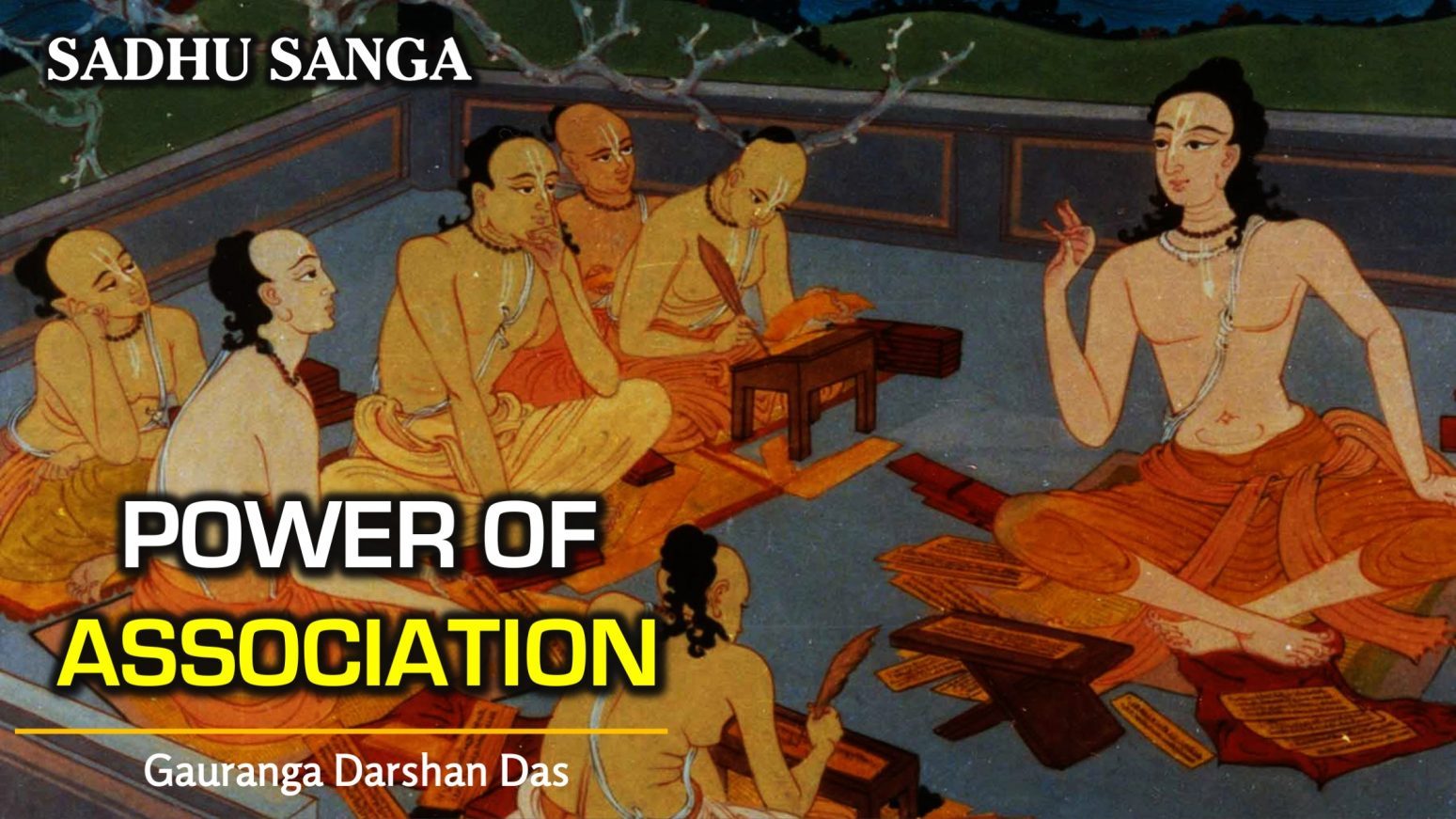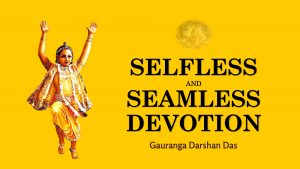SADHU-SANGA: POWER OF ASSOCIATION
By Gauranga Darshan Das
The company that we keep plays a significant role in our lives. Our desires, habits, and goals are often dependent on the association that we are in (saṅgāt sañjāyate kāmaḥ, BG 2.62). Associating with cultured people helps us develop good habits, and associating with corrupt people makes us corrupt generally. The holy scriptures therefore repeatedly recommend that we avoid bad association and keep good association. Here is Lord Kṛṣṇa’s direct description on the glory of saintly association, in the Uddhava-gīta, the philosophical song that He sang to enlighten His dear devotee Uddhava.
1. Destruction of material attachment
Devotee association – (i) reduces one’s inspiration to enjoy sense gratification, (ii) increase one’s inspiration to serve and get attached to Lord Kṛṣṇa. “An intelligent person should reject all bad association and take to the association of saintly devotees, whose words cut off the excessive attachment of one’s mind.” (SB 11.26.26)
tato duḥsaṅgam utsṛjya satsu sajjeta buddhimān
santa evāsya chindanti mano-vyāsaṅgam uktibhiḥ
The worship of a devotee is greater than the direct worship of Kṛṣṇa (mad-bhakta-pūjābhyadhikā, 11.19.21).
2. Vaisnava Behavior: Eight qualities of a Devotee
Saintly devotees are – (i) not dependent on anything material (anapekṣāḥ), (ii) always conscious of Lord Kṛṣṇa (mat-cittāḥ), (iii) completely peaceful (praśāntāḥ), (iv) endowed with equal vision (sama-darśinaḥ), (v) free from possessiveness (nirmamaḥ), (vi) free from false ego (nirahaṅkārāḥ), (vii) free from all material dualities of pain and pleasure, success and failure and so on (nirdvandvāḥ) and (viii) free from material greed (niṣparigrahāḥ). (SB 11.26.27)
santo ‘napekṣā mac-cittāḥ praśāntāḥ sama-darśinaḥ
nirmamā nirahaṅkārā nirdvandvā niṣparigrahāḥ
Mac-cittāḥ or fixing the mind on Kṛṣṇa is the most important quality that makes one gradually attain all other good qualities.
3. Kṛṣṇa-kathā that purifies sins
In the association of saintly devotees, there is constant discussion about Kṛṣṇa (BG 10.9). One who associates with them is certainly purified of all sinful reactions and sinful proclivities (SB 11.26.28). Lord Kṛṣṇa enters the ear holes of devotees through the sound vibration of Śrīmad Bhāgavatam as spoken by pure devotees, and purifies all their shortcomings and material desires which are unfavorable for advancement in bhakti. Spiritual hearing from saintly devotees is so powerful and nourishing to the soul, that it has become the ultimate aspiration of many advanced devotees including Dhruva, Pracetās, Pṛthu, Prahlāda, and so on. When all these devotees attained the darśana of the Supreme Lord, they did not ask for any material benedictions, rather they just asked for an opportunity to associate with pure devotees and hear kṛṣṇa-kathā in that association. Initially one may not have the inclination to hear hari-kathā, but gradually one can develop taste for hearing in the association of devotees.
Even Lord Kapila also speaks to His mother Devahuti about the glory of sādhu-saṅga as follows:
satāṁ prasaṅgān mama vīrya-saṁvido
bhavanti hṛt-karṇa-rasāyanāḥ kathāḥ
taj-joṣaṇād āśv apavarga-vartmani
śraddhā ratir bhaktir anukramiṣyati
“In the association of pure devotees, discussion of the pastimes and activities of the Supreme Personality of Godhead is very pleasing and satisfying to the ear and the heart. By cultivating such knowledge one gradually becomes advanced on the path of liberation, and thereafter he is freed, and his attraction becomes fixed. Then real devotion and devotional service begin. (SB 3.25.25)
Even if one does not receive direct instructions from pure devotees or associate with them, simply by hearing a pure devotee glorify Lord Kṛṣṇa, one can be purified of all sinful reactions (prapunanty agham). There are two ways of association—by vāṇī and by vapuḥ. Vāṇī means words, and vapuḥ means physical presence. Physical proximity with a devotee is sometimes possible and sometimes not, but vāṇī exists eternally. The opportunity to vāṇī-sevā, i.e., to serve a devotee’s instructions, is more than the opportunity to engage in vapu-sevā. When the physical association is available, one may be eager to take it, but when it is not available, one should still continue to serve the devotee or the guru by following the instructions.
4. Achieving bhakti by Kṛṣṇa-kathā
Whoever hears (śṛṇvanti), chants (gāyanti) and respectfully (ādṛtāḥ) takes to heart (anumodanti) these topics about Kṛṣṇa becomes faithfully dedicated to Me (mat-parāḥ) and thus achieves My devotional service (bhaktiṁ vindanti) (SB 11.26.29).
tā ye śṛṇvanti gāyanti hy anumodanti cādṛtāḥ
mat-parāḥ śraddadhānāś ca bhaktiṁ vindanti te mayi
Hearing about Kṛṣṇa is not just an exercise of information gathering, and chanting or speaking about Kṛṣṇa is not just to impress people with one’s knowledge. The word “anumodanti” indicates that a devotee not only hears and chants the narrations about Kṛṣṇa but also takes the message into one’s heart and gradually develops one’s devotion to Kṛṣṇa and the Vaiṣṇava qualities that make one dear to Kṛṣṇa and His devotees.
“Hearing from advanced devotees of Kṛṣṇa saves one from the ocean of material existence. When one obeys the order of a bona fide guru, the polluted workings of the mind are checked, one sees things in a new, spiritual light, and there blossoms the propensity for selfless loving service to the Lord, which gives the fruit of kṛṣṇa-prema, love of Godhead.” (SB 11.26.29 P)
A devotee or a bona fide guru speaks kṛṣṇa-katha in the mood of the servant and doesn’t think oneself to be a great scholar or independent deliverer of people. A humble speaker of kṛṣṇa-kathā becomes appreciative and grateful to the enthusiastic hearers, because of whom the speaker gets an opportunity to glorify Kṛṣṇa and thus be Kṛṣṇa conscious. We see such mood in several speakers of Śrīmad Bhāgavatam including Maitreya Ṛṣi, Sūta Gosvāmī, Nārada Muni, and so on. For instance, Maitreya rejoices to praise Vidura in this way, “O Vidura, you have prayed for my association. But according to me, getting your association is most rare. Just by serving persons associated with you, kṛṣṇa-bhakti will arise! All the descendants of your family are devoted to the Supreme Lord. Just by your eagerness to hear kṛṣṇa-kathā, you make the garland of Kṛṣṇa’s glories (kīrti-mālām) newer and newer at every moment (abhīkṣṇam), in every word, in every verse and every chapter (pade pade). You string together this garland just by the thread of your taste. Placing this garland within the casket of your ears and mind which have condensed attraction, you make it eternally fresh.” (SB 3.8.1)
Thus, proper consciousness of a hearer and speaker of Kṛṣṇa-kathā makes the whole process enlivening and positively transformative to all who access it.
parasparānukathanaṁ pāvanaṁ bhagavad-yaśaḥ
mitho ratir mithas tuṣṭir nivṛttir mitha ātmanaḥ
“One should learn how to associate with the devotees of the Lord by gathering with them to chant the glories of the Lord. This process is most purifying. As devotees thus develop their loving friendship, they feel mutual happiness and satisfaction. And by thus encouraging one another they can give up material sense gratification, which is the cause of all suffering.” (SB 11.3.30)
Sincere hearing purifies one’s heart and thus one achieves bhakti. After achieving bhakti, what more remains to be accomplished for such a perfect devotee? (bhaktiṁ labdhavataḥ sādhoḥ kim anyad avaśiṣyate, SB 11.26.30). Devotional service to Lord Kṛṣṇa is so pleasing that a pure devotee cannot desire anything except service to the Lord. Kṛṣṇa told the gopīs that they would have to accept their service as the ultimate reward of their devotion to Him since nothing awards as much happiness and knowledge as devotional service itself.
5. Service to Pure devotees
In the association of pure devotees, one not only gets the opportunity to hear about Kṛṣṇa but also an opportunity to serve the devotees who are very dear to Kṛṣṇa. By sincerely serving pure devotees, one’s theoretical understanding of spiritual philosophy becomes a practical realization.
After learning about the jīva and the Supreme Lord from Maitreya, Vidura spoke to him, “I understood the science of soul from you and have become convinced by these conclusions coming from your mouth. But I haven’t realized these facts. I am confident that will destroy my lack of realization only by service to your lotus feet.”
By serving the devotees (sādhūn saṁsevatas), one’s dullness, fear, and ignorance are destroyed, just as cold, fear, and darkness are eradicated for one who has approached the sacrificial fire.
6. The safe boat of devotees’ association
The peaceful devotees fixed in spiritual knowledge, are the ultimate shelter giving a strong boat that rescues those who are repeatedly rising and falling and drowning within the fierce ocean of material life (SB 11.26.32).
nimajjyonmajjatāṁ ghore bhavābdhau paramāyaṇam
santo brahma-vidaḥ śāntā naur dṛḍhevāpsu majjatām
Just as food is the life of all creatures, Kṛṣṇa’s devotees are the only refuge of persons fearful of falling into a miserable condition of life (SB 11.26.33). The shelter of pure devotees saves one from being dragged down by material lust and anger because they engage one safely in Kṛṣṇa’s loving service.
7. Association bestows a spiritual vision
The sun allows us only to see external objects, and that too only when he rises in the sky. But Lord Kṛṣṇa’s devotees bestow divine eyes, i.e., spiritual vision to see objects and events in life from a mature perspective. Thus the devotees, who Lord Kṛṣṇa considers nondifferent from Him, are one’s real worshipable deities and real family members. (SB 11.26.34)
santo diśanti cakṣūṁsi bahir arkaḥ samutthitaḥ
devatā bāndhavāḥ santaḥ santa ātmāham eva ca
Foolishness is the wealth of the impious, who place great value on their treasure and firmly make up their minds to remain in the darkness of ignorance. Saintly devotees of the Lord are just like the sun. By the light of their words, the living entities’ eyes of knowledge are opened and the darkness of ignorance is destroyed. ,Therefore, the saintly devotees are one’s real friends, and relatives. They are the proper recipients of service—not the gross material body, which merely clamors for sense gratification.
This Lord Kṛṣṇa enlightens Uddhava about the glory of sādhu-saṅga. So let us eagerly take this opportunity to associate with the saintly devotees of Lord Kṛṣṇa and serve them to the best of our capacity and come closer to Kṛṣṇa consciousness, our ultimate aspiration.
Gauranga Darshan Das, a disciple of His Holiness Radhanath Swami, is the dean of the Bhaktivedanta Vidyapitha at ISKCON Govardhan Eco Village (GEV), outside Mumbai, and a member of ISKCON Board of Examinations (BoEx). He is a sastric teacher and is the author of Gita Subodhini, Bhagavata Subodhini, Caitanya Subodhini, Disapproved but Not Disowned, Bhagavata Pravaha, Caitanya Pravaha, Bhagavata Viveka and other books.




